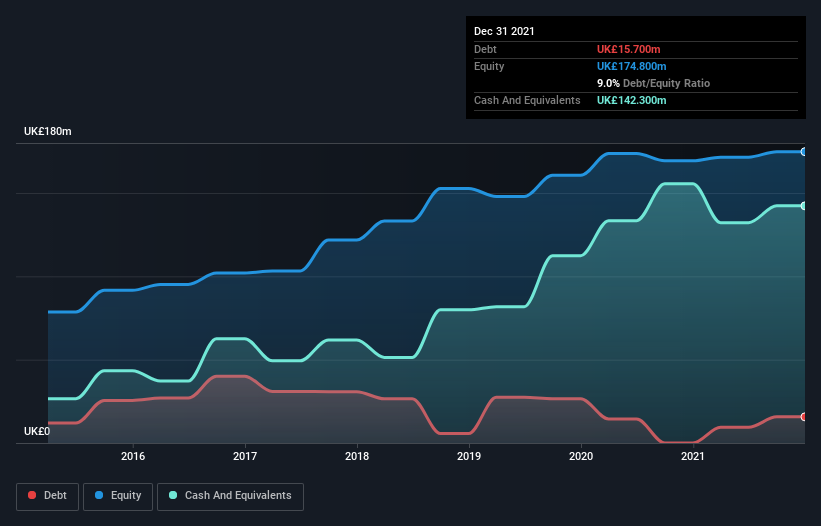- United Kingdom
- /
- Professional Services
- /
- LSE:RWA
Robert Walters (LON:RWA) Seems To Use Debt Rather Sparingly
Some say volatility, rather than debt, is the best way to think about risk as an investor, but Warren Buffett famously said that 'Volatility is far from synonymous with risk.' So it seems the smart money knows that debt - which is usually involved in bankruptcies - is a very important factor, when you assess how risky a company is. As with many other companies Robert Walters plc (LON:RWA) makes use of debt. But should shareholders be worried about its use of debt?
When Is Debt Dangerous?
Debt assists a business until the business has trouble paying it off, either with new capital or with free cash flow. In the worst case scenario, a company can go bankrupt if it cannot pay its creditors. However, a more usual (but still expensive) situation is where a company must dilute shareholders at a cheap share price simply to get debt under control. By replacing dilution, though, debt can be an extremely good tool for businesses that need capital to invest in growth at high rates of return. The first step when considering a company's debt levels is to consider its cash and debt together.
See our latest analysis for Robert Walters
What Is Robert Walters's Net Debt?
As you can see below, at the end of December 2021, Robert Walters had UK£15.7m of debt, up from none a year ago. Click the image for more detail. However, it does have UK£142.3m in cash offsetting this, leading to net cash of UK£126.6m.

How Healthy Is Robert Walters' Balance Sheet?
Zooming in on the latest balance sheet data, we can see that Robert Walters had liabilities of UK£218.2m due within 12 months and liabilities of UK£53.3m due beyond that. On the other hand, it had cash of UK£142.3m and UK£190.3m worth of receivables due within a year. So it can boast UK£61.1m more liquid assets than total liabilities.
This surplus suggests that Robert Walters has a conservative balance sheet, and could probably eliminate its debt without much difficulty. Succinctly put, Robert Walters boasts net cash, so it's fair to say it does not have a heavy debt load!
Better yet, Robert Walters grew its EBIT by 266% last year, which is an impressive improvement. That boost will make it even easier to pay down debt going forward. There's no doubt that we learn most about debt from the balance sheet. But it is future earnings, more than anything, that will determine Robert Walters's ability to maintain a healthy balance sheet going forward. So if you want to see what the professionals think, you might find this free report on analyst profit forecasts to be interesting.
Finally, a business needs free cash flow to pay off debt; accounting profits just don't cut it. Robert Walters may have net cash on the balance sheet, but it is still interesting to look at how well the business converts its earnings before interest and tax (EBIT) to free cash flow, because that will influence both its need for, and its capacity to manage debt. Over the last three years, Robert Walters actually produced more free cash flow than EBIT. That sort of strong cash conversion gets us as excited as the crowd when the beat drops at a Daft Punk concert.
Summing up
While it is always sensible to investigate a company's debt, in this case Robert Walters has UK£126.6m in net cash and a decent-looking balance sheet. And it impressed us with free cash flow of UK£20m, being 142% of its EBIT. So is Robert Walters's debt a risk? It doesn't seem so to us. When analysing debt levels, the balance sheet is the obvious place to start. But ultimately, every company can contain risks that exist outside of the balance sheet. To that end, you should learn about the 2 warning signs we've spotted with Robert Walters (including 1 which shouldn't be ignored) .
At the end of the day, it's often better to focus on companies that are free from net debt. You can access our special list of such companies (all with a track record of profit growth). It's free.
New: AI Stock Screener & Alerts
Our new AI Stock Screener scans the market every day to uncover opportunities.
• Dividend Powerhouses (3%+ Yield)
• Undervalued Small Caps with Insider Buying
• High growth Tech and AI Companies
Or build your own from over 50 metrics.
Have feedback on this article? Concerned about the content? Get in touch with us directly. Alternatively, email editorial-team (at) simplywallst.com.
This article by Simply Wall St is general in nature. We provide commentary based on historical data and analyst forecasts only using an unbiased methodology and our articles are not intended to be financial advice. It does not constitute a recommendation to buy or sell any stock, and does not take account of your objectives, or your financial situation. We aim to bring you long-term focused analysis driven by fundamental data. Note that our analysis may not factor in the latest price-sensitive company announcements or qualitative material. Simply Wall St has no position in any stocks mentioned.
About LSE:RWA
Robert Walters
Provides professional recruitment consultancy services worldwide.
Very undervalued with adequate balance sheet.
Similar Companies
Market Insights
Community Narratives


Recently Updated Narratives

TAV Havalimanlari Holding will fly high with 25.68% revenue growth


Fiducian: Compliance Clouds or Value Opportunity?


Q3 Outlook modestly optimistic
Popular Narratives


MicroVision will explode future revenue by 380.37% with a vision towards success


The company that turned a verb into a global necessity and basically runs the modern internet, digital ads, smartphones, maps, and AI.



